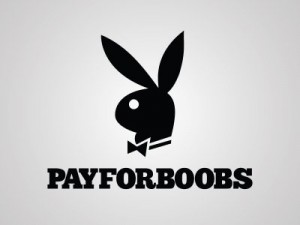Crest. Tropicana. Kellogg. L’Oreal. These are just a few of the brand names I wake up to each morning. The problem is I rarely notice. By the time I’ve headed out the door, I’ve come across over fifteen different brand names. But when I’ve got an 8am class, I don’t really give a hoot whether my orange juice is Tropicana or MinuteMaid.
So what happens the next time I’m at the grocery store? What’s stopping me from switching brands? Truth be told, it’s a simple cost-benefit analysis. If I don’t perceive any value-added by switching brands, what would I have to gain?
Change doesn’t come easy to the consumer. If anything, its the fear of regret that stops us from trying out that new brand of cereal. So how does a brand name help the consumer take the ‘leap of faith’? Armstrong et al. describe creating a ‘relationship’ with the consumer. What better way to start than by being ‘honest’?
Consumers often have established notions of a brand. Take, for example, a parody logo for PlayBoy that showed what people really thought about the brand.

The logo says it all. Or how about a logo that summarizes Disney’s overly-sweet persona?
Needless to say, these images don’t always paint a positive image…but they do capture our attention. By understanding consumer’s ‘honest’ thoughts and conveying them through marketing, brand names are sure to turn heads.
Online job site, Careerbuilder.com decided to target post-recession employees whose jobs were at risk with this marketing campaign.
 By identifying with how many employees felt – in albeit a very creative way – Careerbuilder.com was able to inspire change in the average pencil-pusher via an easy-to-use solution, their website.
By identifying with how many employees felt – in albeit a very creative way – Careerbuilder.com was able to inspire change in the average pencil-pusher via an easy-to-use solution, their website.
Weight Watchers created a similar campaign by targeting overweight women. By creating a very point-blank visual of how many overweight women felt about their weight, they positioned themselves as a brand where women could do something about it.
 Understand, however, that the’honesty’ approach isn’t for everyone. Could you imagine a cigarette’s company’s slogan of ‘We know it’s bad for you, but…’. Other times, stating the obvious doesn’t add value to the consumer.
Understand, however, that the’honesty’ approach isn’t for everyone. Could you imagine a cigarette’s company’s slogan of ‘We know it’s bad for you, but…’. Other times, stating the obvious doesn’t add value to the consumer.
But for the brand that can say, “Yeah, I know what you’re going through. I know you feel,’ the response is only too positive.


Awesome use of visuals in your post, and great job comparing different brands and noting all the brands were exposed to on a daily basis.